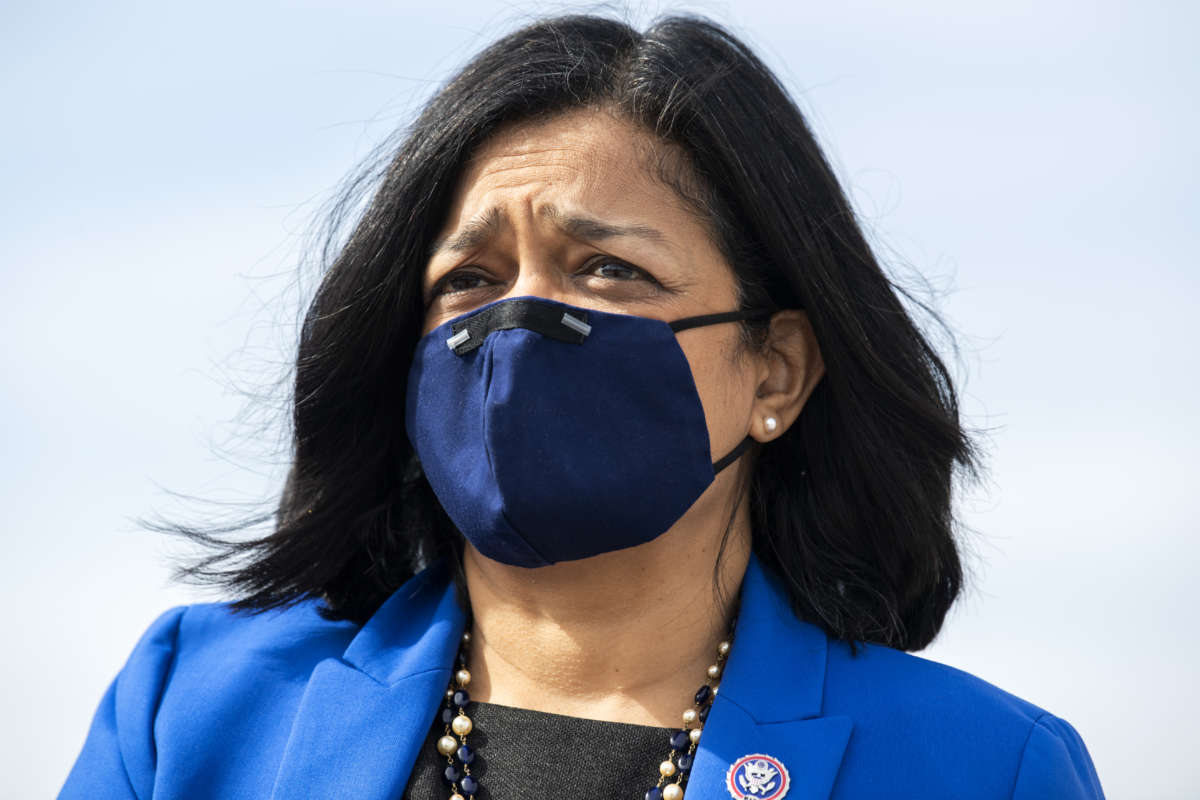Amid a deadly pandemic that has further exposed the absurdity and immorality of tying health insurance to employment, Democratic Reps. Pramila Jayapal and Debbie Dingell are planning to introduce the Medicare for All Act of 2021 this coming Wednesday — exactly one year after the first coronavirus cases were confirmed in all 50 U.S. states and the District of Columbia.
The bill’s official introduction, set for March 17, “is an attempt to link the cause of universal care with the devastation wrought by the pandemic,” Politico reported.
“Mark your calendars!” tweeted Jayapal (D-Wash.), a longtime single-payer advocate who was the lead House sponsor of the Medicare for All Act of 2019, which experts at the time characterized as the gold standard for universal healthcare legislation. The bill proposed a two-year transition to a Medicare for All system that would provide comprehensive healthcare to everyone in the U.S. for free at the point of service.
Since the coronavirus crisis began last year, millions of people across the U.S. have been thrown off their employer-provided health insurance — the nation’s most common form of coverage — due to pandemic-induced mass layoffs that have persisted in recent weeks. Last week, an additional 1.2 million people in the U.S. filed for unemployment insurance.
“This past year makes it incredibly clear why we must pass Medicare for All,” said Nina Turner, a Democratic congressional candidate in Ohio’s 11th District.
Mark your calendars!https://t.co/DutW79bKBB
— Rep. Pramila Jayapal (@RepJayapal) March 11, 2021
While progressives such as Jayapal and Sen. Bernie Sanders (I-Vt.) have called for an expansion of Medicare to cover the newly uninsured — and everyone else — for the duration of the pandemic, congressional Democrats went a different route in the newly passed American Rescue Plan, which significantly expands eligibility for Affordable Care Act subsidies and fully covers private premiums under COBRA, an expensive program that lets laid-off workers stay on their employer-provided insurance.
Speaking to the New York Times last week, Jayapal — the chair of the Congressional Progressive Caucus — made clear her disagreement with that approach.
“I don’t think this was the most efficient way to do this,” Jayapal said of the American Rescue Plan’s expansion of private insurance.
The nearly $2 trillion relief package, which President Joe Biden — a Medicare for All opponent — signed into law on Thursday, also includes funding to incentivize states to expand Medicaid, an offer that’s unlikely to be taken up by Republican governors.
Social Security Works, a progressive advocacy organization, tweeted in response to the coming introduction of the latest iteration of the Medicare for All Act that “tying healthcare to employment was ridiculous and cruel before the pandemic.”
“And now, with millions more Americans unemployed, it’s horrific,” the group said. “We must guarantee healthcare as a human right — not as an employment benefit. We need Medicare for All.”
Join us in defending the truth before it’s too late
The future of independent journalism is uncertain, and the consequences of losing it are too grave to ignore. To ensure Truthout remains safe, strong, and free, we need to raise $24,000 by the end of today. Every dollar raised goes directly toward the costs of producing news you can trust.
Please give what you can — because by supporting us with a tax-deductible donation, you’re not just preserving a source of news, you’re helping to safeguard what’s left of our democracy.
